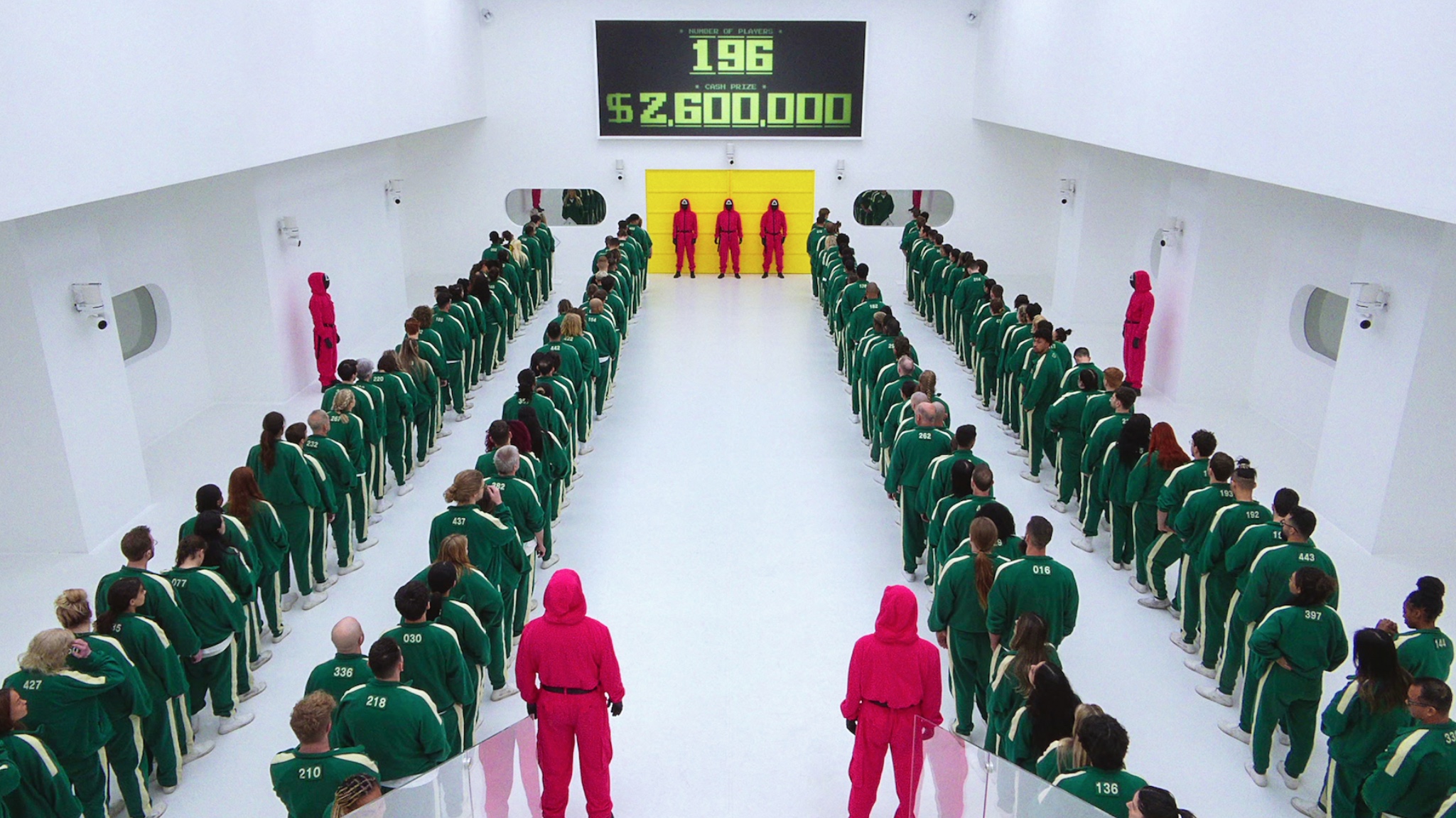Chasing Prizes, Facing Ethics: Navigating the Controversies of Netflix’s “Squid Game: The Challenge”
Gallery

“Squid Game,” the acclaimed South Korean drama on Netflix, explores themes of despair through a deadly competition involving players in debt. For those unfamiliar, Squid Game features recreated versions of iconic games, with 456 players competing for a substantial $4.56 million prize. The initial episode, “Red Light Green Light,” features players being shot if caught moving when the sign says “red light.” The original series, a satirical take on the horrors of capitalism, gained global acclaim for its portrayal of desperation and fighting among working-class participants risking their lives for a massive cash prize.
Given the popularity of the fictional show, a real-life adaptation called “Squid Game: The Challenge” emerged, mimicking the original show’s scenarios without actual harm. The reality adaptation brings the iconic games to life, featuring 456 participants competing for the $4.56 million prize, starting with “Red Light Green Light.” Unlike a straightforward elimination, players caught moving experienced a tiny explosion, mimicking a gunshot wound, aiming for shock value. The finale of “Squid Game: The Challenge” featured a rock, paper, scissors showdown, where Mai Whelan emerged victorious, claiming a staggering $4.56 million.
“Squid Game: The Challenge” has generated not only immense viewer interest but a cascade of controversies that have left participants and audiences questioning the safety, ethics and integrity of the production.
The simulated mass shooting and panic in the first episode of “The Challenge” raises ethical concerns, questioning how such content got approval. The absence of objections about potential insensitivity, especially in the aftermath of real-life mass shootings, is criticized as a lapse in decency by all involved. Critics have argued that this “mishandling” of Squid Game’s success echoes Netflix’s history of treating impactful works carelessly, marking a trend in the media landscape.
“The Challenge” maintains an all-English-speaking cast, diverging from the South Korean original, which fans see as dismissive and logistically convenient. The show leans heavily on contestants’ financial struggles, framing it as a financial lifeline, a departure from other competitions that delve into personal tales with a more delicate touch.
During the filming of “Squid Game: The Challenge,” contestants allegedly lived in poor conditions and there were lapses in safety precautions. Reports emerged of injuries during the “Red Light, Green Light” game, conducted in freezing temperatures in a former airplane hangar. Reports suggest that during filming of “Red Light, Green Light,” participants had to wear thin tracksuits in frigid temperatures. Some contestants claimed the environment was “inhumane,” describing a nine-hour race and instances of a lack of medical treatment.
Express Solicitors, a British personal injury law firm, reported that two contestants considered legal action, seeking compensation for injuries during filming. Allegations include hypothermia and nerve damage from ill-fitting clothing in cold temperatures. Netflix and production companies denied serious injury claims.
Former contestants shared mixed experiences, describing the conditions as stressful but bearable, with varied opinions on fairness. Lorenzo (Contestant 161) emphasized adaptability, Spencer (Contestant 299) detailed preparing for challenges, and Bryton (Contestant 432) defended the fairness of the experience.
Sabrina Sabir, a.k.a. Contestant 277, exited the competition and clarified the conditions on the set in an interview with Dexerto. She stated that while the “Red Light, Green Light” challenge was challenging, it wasn’t as “inhumane” as some contestants have claimed. Sabir explained the difficulties, emphasizing the intense game played in 24-degree weather in a vast, open space during the UK’s January weather.
While filming, there were extended waiting intervals of 15 to 20 minutes, totaling around eight hours. Despite the challenges, contestants had thermal clothes underneath their suits, and they could call for a medic or assistance if needed. Sabir mentioned that staff members promptly attended to those struggling in the conditions.
Sabir acknowledged the producers’ efforts, suggesting that they could have improved by anticipating the weather better.
Allegations of rigging also surfaced, suggesting predetermined storylines for contestants with larger social media followings and a “38-second massacre” during the first round. Contestants criticized the show, calling it a TV show rather than a genuine game show, with the names “Rigged Game” and “Net Fix.”
The reality competition introduces Bryton Constantin, Contestant 432, as a notable villain, portraying his arrogance and dominance over others. Constantin admitted in an online Q&A that he advanced in the cookie challenge despite breaking his cookie. While Constantin’s confession adds a funny twist, it fuels suspicions that the show may have manipulated outcomes.
The champion of Netflix’s first season of “Squid Game: The Challenge,” Mai Whelan (Contestant 287), disclosed that she has not yet received the $4.56 million prize despite the finale. In an interview with The Times, she likened her situation to the iconic line from the film, “Jerry Maguire,” saying, “Show me the money!” Despite her buyer’s remorse over a recent splurge on a designer outfit for a Netflix event, Whelan remains optimistic. One of the criticisms of “Squid Game: The Challenge” is that the reality game show undermines the original show’s message about capitalism’s pitfalls. Creator Hwang Dong-hyuk, who faced financial struggles while developing the original series, signed a Netflix contract relinquishing intellectual property rights and residuals. Despite the original show’s massive success, Hwang feels somewhat bitter, stating in an interview with the Guardian, “I’m not getting anything out of it.”
“Squid Game: The Challenge” executive producer, Tim Harcourt, downplayed the original show’s anti-capitalist storyline, leading to online backlash. YouTube star, MrBeast, capitalized on the trend by recreating Squid-Game-like trials, obtaining significant views. While initially criticized for missing the original’s satire, MrBeast’s approach appeared more aligned with viewer expectations.
Netflix CEO, Ted Sarandos, confirmed a second season of the reality game show and plans to expand “Squid Game” into a multi-media franchise, including live experiences, merchandise, mobile gaming and reality television. Critics argue that the reality adaptation, in attempting to capitalize on the original’s themes, misses the mark.
All episodes of “Squid Game: The Challenge” and the original “Squid Game” are available for streaming on Netflix.
